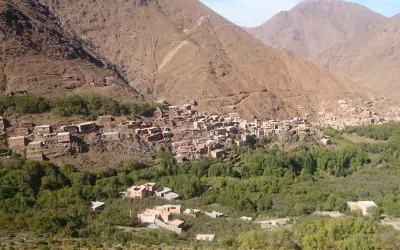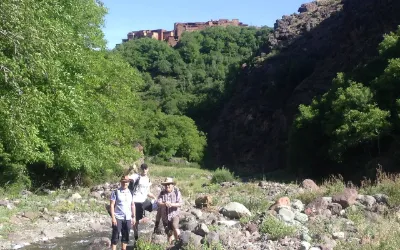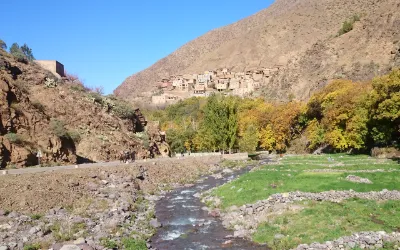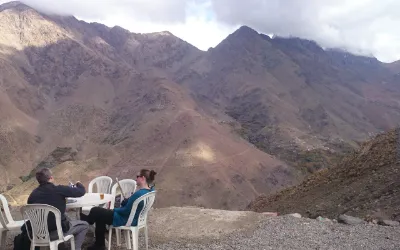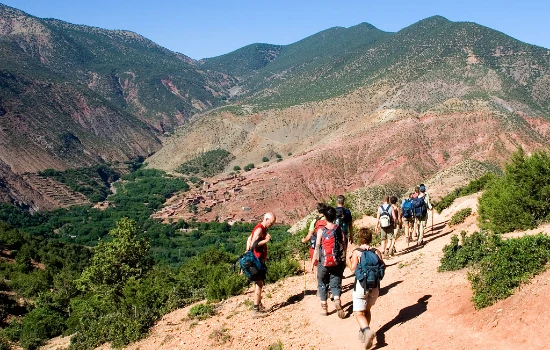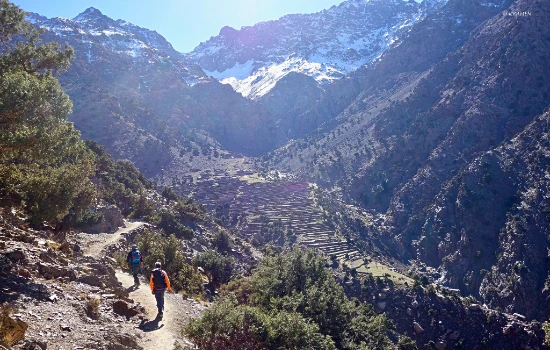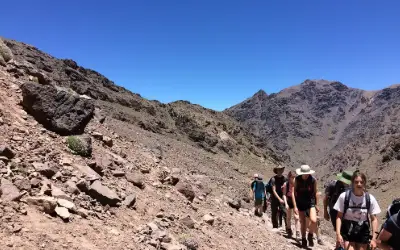
Family trek in Morocco 4 days
Tour snapshot
4 Days
Atlas Mountains - Morocco
210 € / per person
Learn more
Overview
Family trek in Morocco
Fantastic family trekking in Morocco During your family trek in the Atlas Mountains, we can offer you an extra mule for your child to ride on if they become tired. This can also available just for fun! We are able to adapt any of our itineraries to suit your family’s requirements. For under 12 years, we recommend our Imlil Valley, Berber valleys, Berber Markets Trekking. As we do not recommend the summit of Toubkal for under 12 years because of the steep terrain and the altitude, we have put together an interesting and Berber cultural trek in the High Atlas Villages. You will be walking for 4 to 5 hours but each day differs in the amount of Ascent. We have tried and tested groups of schools’ students and it has proved to be very manageable for all involved!
What's Included
Group Pricing
| Participants Number | Price |
|---|---|
| 2 peopel | 245 € / per person |
| 3 to 6 peopel | 230 € / per person |
| 7 to 13 peopel | 210 € / per person |
Booking Form
From EU 210€ / Per personItinerary
The day’s trekking will take you from Imlil and Pass below the village of tamatert, joining a track which takes you over the col of Tizi N’Tamatert (2279m) to enjoy the amazing panorama of the surrounding Atlas Mountain ranges. You will take your picnic lunch on the Tamatert pass, overlooking Jebel Oukaimeden (3205m) and the beautiful encircled plateau. After lunch, you will set off following the path to the traditional Berber village before we arrive at one called Tachedirt, where we will spend the night. We will stay in a Berber guesthouse will be simple and basic but has beds with foam mattresses. The food will be cooked by the Mount Toubkal Expedition cook who is traveling with you. 4 hours walking
After helping to load our mules and a good breakfast, we leave Tacheddirt village along Imnane valley and head to Imsker (1300m). You will head down the Imnane Valley passing through the following Berber villages: Ounskra, Tamguiste, Ikkis, Ammssakrou and Arg where will you will have the opportunity to see the local community going about their daily lives. you will set off following the path down to the traditional Berber village before we arrive at one called Imsker, where we will spend the night. We will stay in a Berber guesthouse, will be simple and basic but has beds with foam mattresses. The food will be cooked by the Mount Toubkal Expedition cook who is traveling with you.
After helping to load our mules and a good breakfast, we leave Imsker (1300m) to Tizi Oussem village and follow the path up to Tizi N’Lbour pass(1500m), Here we leave the Imnane valley and head up over the L’bour Pass (1500m). Then, a descent to the Ait Mizane valley which flows through Imlil. We cross the metalled road leading to Imlil and climb up the valley side to the village of Imi Oghelad. From here, we continue to climb, over the Tizi N’Tachet (2000m), and then continue the trek down the Azzaden valley, where we will spend the night. We will stay in a Berber guesthouse, will be simple and basic but has beds with foam mattresses. The food will be cooked by the Mount Toubkal Expedition cook who is traveling with you.
After helping to load our mules and a good breakfast, we start our trek by following the Azzaden Valley up to the south as it narrows and approaches the mountains that feed its river. High above to the west is the Tazaghart Plateau ( 3900m), a mountain with a flat top around 1,5km across. We will see the cliffs rising up to its lip to the right of the valley head. We will continue to where the valley narrows to a cliffed gorge and a large waterfall crashes down into the bottom. After a rest at the waterfall, we will follow the valley back down but this time follow the path up the East side of the valley and work our way around and up to the high pass at Tizi Mzik 2479m. From here, we get a superb view down into the Ait Mizane Valley and the handful of villages that are known collectively as Imlil. We descend to the beautiful valley of Imlil and landscapes lush valley surrounded by orchards. Lunch on the terrace under the tall trees of walnut. Then we continue to Imlil village where we meet our vehicle and back to Marrakech afternoon.
Additional Informations
About The Trek
Mount Toubkal – Essential Info
At Mount Toubkal, the World we believe in provide our clients with the best services and key to the enjoyment of any holiday in our opinion, it is the balanced and up-to-date information offered by the tour operator. We are confident that the items detailed below when taken in conjunction with a reputable and reliable guidebook will enhance your Trekking experience as well as ensuring you receive the very best service from Mount Toubkal, the World in the Atlas Mountains of Morocco.
M-T : STAFF
It is important that our staff in our Mount Toubkal office have experienced the wonder of High Atlas Mountains Trekking and are able to answer many of your important questions.
Mohamed, for example, has trekked in the Toubkal and Berber regions and visited many of the places included on our hiking itineraries has also made it to the top of Jebel Toubkal – many of the photos on our website were taken by him and his traveling companions on his various trips to the region.
M-T : GUIDES
All Mount Toubkal guides are fully licensed and are experienced from an early age in the Atlas Mountains areas, and guiding continues to be the heart and soul of who we are. We require that all of our guides undergo extensive safety training before officially joining us a mountain guide /or winter guide, local knowledge and guiding abilities. We believe that a local, licensed guide will offer more insight into the High Atlas region and Berber people as well as enhancing the local economy.
As well as a tip (see below) if you have had a great experience with your guide, you may wish to offer him something of yours that will assist his duties.
Please be guided by your guide’s expert advice on difficult or exposed paths and please respect the prayers of your guide and muleteers – they will usually do this outside of walking times so as not to interrupt your hiking.
M-T : MULETEERS & MULES & LUGGAGE
Your team of muleteers, along with mules, will vary in number depending upon the size of your group and whether you are camping or staying in guesthouse/refuge but they will all perform the same function which is to provide a full back up service for your hike, cook and prepare meals and set up the evening camp.
The mule team will load up your luggage, food and, if relevant, the camping equipment at the start of each day but will not always walk either at the same time, pace or route as your hiking party. So, it is important that you consider which items you may require to carry yourself in the morning and then again in the afternoon as on some days you may only meet up at lunch-time.
The mules are completely used to carrying the loads and it is not unusual for them to carry in excess of 80 kgs each which is equally balanced in two baskets. The muleteers take great care in both hygiene and presentation of your food and perform wonders with such limited conditions.
We recommend you take your trekking luggage in a large holdall or rucksack which can perhaps be folded up inside your main luggage if you are also traveling around the Atlas Mountains and wish to have the security of your usual suitcase(s). You should also take a suitable daypack which will carry drinking water, camera, hat, raincoat, etc. as you may not be in direct contact with your support team at all times during the day.
WEATHER
In winter, much of the region above 2500m can be snow-covered and hiking in these areas could require the use of crampons and ice axes. High winds and precipitation in whatever form may preclude some routes and this will be discussed before you set out or can be modified at any time with the advice of your guide.
Berber tea house
The Accommodation will be in a Berber guesthouse will be simple and basic but has beds with foam mattresses. The food will be cooked by the Mount Toubkal Expedition cook who is traveling with you.
CAMPING
Camping is an option if preferred (June-Octo).
We provide modern igloo-style tents that sleep two persons each; they are of various sizes so ideally, we would like to be advised in advance if any of your party is particularly tall (6 ft or over). So that, we can provide the most suitable tents for all groups.
Along with the sleeping tents, we also provide one or more large traditional Berber tents for cooking, eating and socializing which make your camp a little bit special.
NB: If accommodation is required in the Atlas Mountains either before or after the trek, we can always book you at our Imlil Refuge or at our Riad Dar Bab Toubkal in Armed village.
Clothing and Equipment
You should dress according to altitude and the environment you will be located in. Most treks are in high altitude climates in remote areas. Therefore, there are often large temperature swings. Temperatures are often colder at high altitudes.
Clothing for Trekking
Trekking boots or lightweight walking shoes. Having comfortable footwear is essential for a good trek. Make sure all footwear is broken in well prior to your trek. Do not break in boots on your trek,
A tracksuit and a pair of track shoes to wear in the Berber tea house and camp at night,
Two pairs of woolen socks for trekking shoes and track shoes,
Warm down jacket and rainproof jacket with hood for protection from rain,
Woolen hat for the cold and sun hat or cap for sunny days
A pair of woolen gloves and a pair sandals to wear in Berber tea houses or camp,
Two cotton T-shirts and two pairs of long shorts/skirts
Woolen shirts and thick sweaters as well as wind and waterproof trousers,
Pair of light or heavyweight trouser and one lightweight long sleeve shirt,
Two pairs of thermal undergarments,
Equipments for Trekking
Trekking or duffle bag to carry trekking gear. Mount Toubkal can provide a duffle bag for you to borrow during your trek. This will be returned after your trek,
Trekking daypack for personal items such as water, snacks, extra layers and camera,
Water purification tablet and bottles,
Sleeping bag,
Travel Pillow,
sunglasses,
Sunblock,
Lip balm with sunblock in it,
handkerchief or wiping papers,
Money belt,
First-aid kit,
Trekking equipments are available at Imlil Center. Mount-Toubkal can recommend shops for you to purchase equipment. If you do not wish to buy equipment, you can easily hire or rent them for the duration of your trek with reasonable prices.
Similar Experiences



